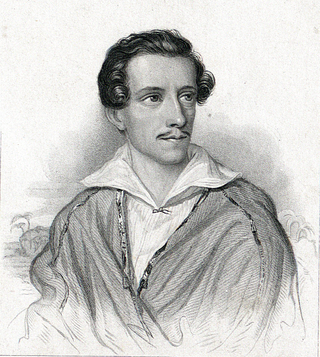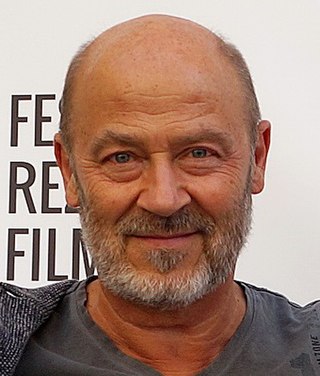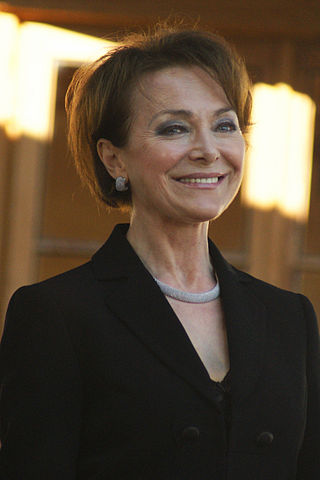
Jerzy Andrzejewski was a prolific Polish writer. His works confront controversial moral issues such as betrayal, the Jews and Auschwitz in the wartime. His novels, Ashes and Diamonds, and Holy Week, have been made into film adaptations by the Oscar-winning Polish director Andrzej Wajda. Holy Week and Ashes and Diamonds have both been translated into English. His novel The Gates of Paradise was translated into English by James Kirkup and published by Panther Books with the anglicised spelling "George Andrzeyevski".

Józef Arkusz was a Polish film director and producer of over 70 educational films.

Juliusz Słowacki was a Polish Romantic poet. He is considered one of the "Three Bards" of Polish literature — a major figure in the Polish Romantic period, and the father of modern Polish drama. His works often feature elements of Slavic pagan traditions, Polish history, mysticism and orientalism. His style includes the employment of neologisms and irony. His primary genre was the drama, but he also wrote lyric poetry. His most popular works include the dramas Kordian and Balladyna and the poems Beniowski, Testament mój and Anhelli.

Józef Zachariasz Bem was a Polish engineer and general, an Ottoman pasha and a national hero of Poland and Hungary, and a figure intertwined with other European patriotic movements. Like Tadeusz Kościuszko and Jan Henryk Dąbrowski, Bem fought outside Poland's borders anywhere his leadership and military skills were needed.

Jan Henryk Dąbrowski was a Polish general and statesman, widely respected after his death for his patriotic attitude, and described as a national hero who spent his whole life restoring the legacy of Poland.

Józef Glemp was a Polish cardinal of the Catholic Church. He was Archbishop of Warsaw from 1981 to 2006, and was elevated to the cardinalate in 1983. He assumed the title of Primate of Poland following Wyszyński's death.

Antoni Lange was a Polish poet, philosopher, polyglot, writer, novelist, science-writer, reporter and translator. A representative of Polish Parnassianism and symbolism, he is also regarded as belonging to the Decadent movement. He was an expert on Romanticism, French literature and a popularizer of Eastern cultures. His most popular novel is Miranda.

Jan Jakub Kolski is a Polish film director, cinematographer, and writer.

Anna Jantar-Kukulska was a Polish singer and the mother of singer Natalia Kukulska. She is considered an icon of Polish pop music, and also one of the most famous Polish singers of the 1970s.

Michał Waszyński was first a film director in Poland, then in Italy, and later a producer of major American films, mainly in Spain. Known for his elegance and impeccable manners, he was known by his acquaintances as "the prince".

Witold Pyrkosz was a Polish actor.

Diamond Bitch is the debut studio album by Polish pop-rock recording artist Doda. It is her first solo album recorded after the rock band Virgin disbanded. It was released in Poland on July 27, 2007. Becoming a massive success, the album went straight to number one, and stayed there for five straight weeks.

Irena Wanda Jarocka, was a Polish singer.

Enigmatic is the fourth album by Czesław Niemen, released in 1970. It has been considered by some to be the best Polish rock album ever. Inspired in 1968 by Wojciech Młynarski, Niemen decided to make his new album with Polish poetry as lyrics. Recorded in 1969, the album became very popular and was awarded with a golden record in 1971. As of 2012, the album has sold in excess of 5 million copies around the world and remains very popular.

Jan Nepomucen Głowacki was a Polish realist painter of the Romantic era, regarded as the most outstanding landscape painter of the early 19th century in Poland under the foreign partitions. Głowacki studied painting at the Kraków School of Fine Arts and later at the academies of Prague and Vienna, as well as Rome and Munich. He returned to Kraków in 1828, and became a teacher of painting and drawing. From 1842 he served as a professor in the Faculty of Landscape Painting at the School of Fine Arts. His work can be found at the National Museum of Poland and its branches. Some of his work was looted by Nazi Germany in World War II and has never been recovered.
Tomasz Napoleon Nidecki was a Polish composer, conductor and teacher.

"A Funeral Rhapsody in Memory of General Bem" is a poem by Polish poet Cyprian Norwid, a descendant of the Polish king John III Sobieski. It is an elegy for a famous Polish commander, Józef Bem, who was a hero of three nations, Polish, Hungarian and Turkish. It was written in 1851. The poem is a description of an imaginary funeral. It is described as a funeral of a medieval knight or Slavic warrior, encased in armour, with his horse and a falcon, accompanied by groups of boys and girls. The poem is especially interesting because of its form. It was written in rhymed hexameter. All the lines are made up of fifteen (7+8) syllables according to the pattern ' x ' x x ' x || ' x x ' x x ' x.

Bartosz (Bart)Staszewski (born 23 September 1990) is a Polish filmmaker and LGBT activist. He is the creator of the documentary Article Eighteen, co-founder of the Equality March in Lublin association and the Miłość Nie Wyklucza foundation ('Love Does Not Exclude'), which promotes same-sex marriage in Poland. Staszewski was the target of death threats and intimidation in 2019 and 2021 in relation to his activism.

Józef Weyssenhoff was a Polish novelist, poet, literary critic, publisher. Close to the National Democracy political movement after 1905, he paid tribute to the tradition of the Polish landed gentry in the Eastern Borderlands. He lived several years in Bydgoszcz in the 1920s.

Józef Pyrz, known in France as Joseph or Jonasz Pyrz, was a Polish sculptor, poet and philosopher who lived in France from 1979 until his death. Also known as the "Prophet" ("Prorok"), Joseph Pyrz was the co-founder and leader of the hippie movement in Poland in the 1960s and 1970s. He was born on 17 February 1946 in Gawłówek, Poland, and died there on 24 Sept 2016 while on a visit.



















